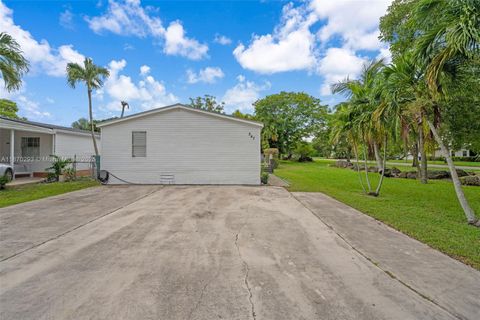Mobile Homes For Sale in South Florida
Mobile homes offer an affordable and flexible housing option for many people in Florida. Whether you’re looking for a permanent residence, a seasonal retreat, or an investment property, Florida’s mobile home market has a variety of options to suit your needs.
A mobile home, also known as a manufactured home, is a type of prefabricated housing that is built in a factory and then transported to a specific site. Mobile homes are a popular housing option due to their affordability, flexibility, and convenience.
Key Characteristics of Mobile Homes
- Construction:
- Factory-Built: Mobile homes are constructed in a controlled factory environment, which helps to ensure consistent quality and efficiency in the building process.
- Standardized Materials: They are typically built using standardized materials and techniques, which can reduce construction costs.
- Transportability:
- Movable Units: Mobile homes are designed to be transported to a specific location, usually on their own wheels or via a flatbed truck.
- Permanent Placement: Once in place, mobile homes are often set on a permanent foundation and can be connected to utilities just like traditional homes.
- Affordability:
- Lower Cost: Mobile homes generally cost less than traditional site-built homes, making them an attractive option for first-time buyers, retirees, and those on a budget.
- Lower Maintenance: They often require less maintenance and have lower property taxes than traditional homes.
- Size and Layout:
- Single-Wide and Double-Wide: Mobile homes come in various sizes, with single-wide units being narrower and more compact, and double-wide units offering more space with a wider layout.
- Customizable Interiors: Many mobile homes offer customizable floor plans and interior features to suit individual preferences and needs.
- Regulations and Standards:
- HUD Code Compliance: In the United States, mobile homes must comply with the HUD (Housing and Urban Development) Code, which sets standards for construction, safety, and energy efficiency.
- Zoning and Placement: Mobile homes must adhere to local zoning laws and regulations regarding where they can be placed and how they must be installed.
Types of Mobile Homes
- Single-Wide Mobile Homes:
- Narrower and more compact, typically 14 to 18 feet wide and 60 to 90 feet long.
- Easier to transport and often less expensive.
- Double-Wide Mobile Homes:
- Consist of two sections joined together, typically 20 to 36 feet wide and 60 to 90 feet long.
- Offer more space and a layout similar to traditional homes.
- Triple-Wide and Larger Mobile Homes:
- Consist of three or more sections joined together, offering even more space and customization options.
- Less common but available for those needing more room.
Advantages of Mobile Homes
- Cost-Effective: Generally more affordable than traditional homes.
- Flexibility: Can be placed in various settings, including mobile home parks, private lots, and rural areas.
- Speed of Construction: Built faster than traditional homes due to the factory construction process.
- Modern Amenities: Many mobile homes come with modern amenities and features similar to site-built homes.
Disadvantages of Mobile Homes
- Depreciation: Unlike traditional homes, mobile homes may depreciate in value over time.
- Financing: Obtaining financing for a mobile home can be more challenging than for a traditional home.
- Zoning Restrictions: Some areas have zoning laws that limit where mobile homes can be placed.
- Affordability:
- Mobile homes are generally more affordable than traditional single-family homes or condos.
- Lower purchase prices and maintenance costs make them an attractive option for first-time buyers, retirees, and budget-conscious buyers.
- Flexibility:
- Mobile homes can be placed in a variety of settings, including mobile home parks, private lots, and rural areas.
- They offer the flexibility to move if your needs or circumstances change.
- Prime Locations:
- Florida offers numerous mobile home communities in desirable locations such as coastal areas, near major cities, and in tranquil rural settings.
- Many communities provide easy access to amenities like shopping, dining, healthcare, and recreational facilities.
- Community Living:
- Mobile home parks often foster a strong sense of community, with organized activities, social events, and shared amenities like swimming pools, clubhouses, and fitness centers.
- Some communities are age-restricted, offering a quiet and relaxed environment for retirees.
- Low Maintenance:
- Mobile homes typically require less maintenance than traditional homes, with smaller yards and simpler structures.
- Many mobile home parks include maintenance services as part of their monthly fees.
- Location: Consider the proximity to amenities, work, schools, and recreational activities.
- Community Rules and Fees: Understand the rules and regulations of the mobile home park, including monthly fees, pet policies, and age restrictions.
- Inspection and Maintenance: Ensure the mobile home is in good condition with a thorough inspection, and be aware of ongoing maintenance needs.
- Financing Options: Explore financing options, as some lenders have specific requirements for mobile home loans.
Mobile homes in Florida offer an affordable, flexible, and community-oriented housing option. Whether you’re looking for a permanent residence, a vacation home, or an investment property, Florida’s mobile home market has something to offer. Start your search today and find the perfect mobile home to fit your lifestyle and budget.
Click “See All Results” below the following list to view more properties.










